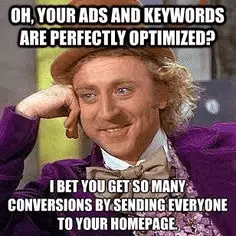Being careless with Adwords can drastically change the message of your ads. These errors will occur mostly due to an out of date website, contextual keyword errors, or not setting grouping keywords properly. Below are 5 Adwords fails and our recommendations on how to avoid them.
-
Directing People to a Bad Website
User experience and overall quality score are two components that will cause a campaign to over spend or not get displayed at all. We suggest making sure your website is up to date before spending money on Google. Sending potential clients to an ugly or poorly designed website will hurt conversions drastically and reduce quality score. The three questions we ask when evaluating whether to send people to a client’s website are the following:
- Is the layout update to date?
- Is the content relevant and interesting?
- Are they using high quality images?
Modern website designs follow certain conventions including a header menu with drop downs and an overall clean design. If these elements are absent, users will not be confident in the business and most likely bounce (meaning they will leave your website). Content, both media and text, needs to be engaging and also not have any spelling, grammar, or punctuation errors. Lastly, images need to be high quality but not be too large, otherwise they will take a long time to render.
-
Not Sending Visitors to a Targeted Landing Page
Every campaign built in Adwords should be directed to a specific landing page based on the keywords used and the ad text. People are lazy and when someone clicks on a PPC ad they are looking to inquire or bounce. If they are asked to do any extra steps or navigate a poorly designed page, they will leave. Insuring a strong call to action is in place will give the visitor every reason to convert. The biggest question that needs to be asked: How impactful is the landing page? If the value proposition of why the visitor should fill out the form or call the number is not clear, the message needs to be changed. Also, never simply drop a user on the home page and assume they will navigate the rest of the site and convert. This is not what PPC dollars should be spent on, and sending someone to just the home page is why organic SEO is powerful. Messing with this convention is a waste of ad spends.

-
Nonspecific Ad Text
Once again, people are lazy and are not as likely to interact with ads that they know are in fact just advertisements. The goal is to make your ad stand out in the sea of paid results for a given search result. Making sure that the ad text includes a keyword or phrase they would have typed in the search bar. The ad needs to stand out, so use capital letters for each word. The call to action also needs to be different. All too many advertisers use “click here”. That is understood though, and does not need to be said. “Call now” is also a waste of characters and a line that many advertisers use. “See our offers” is a vastly superior way to entice people to actually click on the ad.
-
Not Using Regional Targeting
By default, ads are visible nationwide, which works just fine if your business is nationwide. If this option is not modified though, you will be spending money on clicks that will not convert or potential spam entries. Adwords provides a great radius targeting option that allows for advertisers to pinpoint exactly where they what their ads to hit. Time is also a factor that should be taken into account. This way, ads are not being run late at night for a client that is only open during lunch hours. It is also possible to target multiple stats simultaneously. Customizing these options for a client before setting up a campaign is crucial to improve conversion.
-
Using Only Broad Match
Adwords offers three matching options for keywords: Broad, Phrase, and Exact. Broad ads are shown for any version of the desired phrase and variations of this phrase. Phrase ads are shown when this phrase is entered exactly. Exact ads are shown only when the desired phrase is entered exactly. Broad matching can be useful for running brand awareness campaigns or when selling products that are well known. For everyone else, these match types needs to be used sparingly otherwise the results will not be great.
A good rule of thumb is to use phrase match in most cases and exact match if you have many variants that you are able to add.
When running Google PPC just creating a campaign is not enough. By default, if a campaign is left unmanaged the results can waste ad spend or result in unintended results.
Interested in running Adwords for your campaign? The experts at Today’s Business can handle this and more for you.